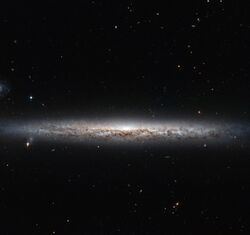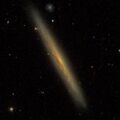Astronomy:NGC 3501
From HandWiki
| NGC 3501 | |
|---|---|
 NGC 3501 imaged by the Hubble Space Telescope | |
| Observation data (J2000 epoch) | |
| Constellation | Leo |
| Right ascension | 11h 02m 47.307s[1] |
| Declination | +17° 59′ 22.31″[1] |
| Redshift | 0.003769[2] |
| Helio radial velocity | 1130[2] |
| Distance | 77.02 ± 6.06 Mly (23.615 ± 1.857 Mpc)[2] |
| Apparent magnitude (B) | 13.8[3] |
| Characteristics | |
| Type | Scd:[2] |
| Mass | 1.5×1010[4] M☉ |
| Size | 89,600 ly (27,480 pc)[2] |
| Apparent size (V) | 4.4′ × 0.56′[2] |
| Other designations | |
| HOLM 224B, UGC 6116, MCG+03-28-051, PGC 33343 | |
NGC 3501 is an edge-on spiral galaxy 80 million light years away, located in the constellation Leo. It was discovered on 23 April 1881 by French astronomer Édouard Stephan.[5] NGC 3501 is a young galaxy, consisting mostly of stars aged between 2 and 8 billion years.[4]
NGC 3501 was imaged by the Hubble Space Telescope in 2014, showing an edge-on spiral galaxy; its companion NGC 3507 is not included in the photograph.[6] It is a member of the NGC 3607 Group of galaxies, which is a member of the Leo II Groups, a series of galaxies and galaxy clusters strung out from the right edge of the Virgo Supercluster.[7]
Gallery
-
NGC 3501 (SDSS DR14)
-
NGC 3501 (HST)
See also
References
- ↑ 1.0 1.1 Skrutskie, Michael F.; Cutri, Roc M.; Stiening, Rae; Weinberg, Martin D.; Schneider, Stephen E.; Carpenter, John M.; Beichman, Charles A.; Capps, Richard W. et al. (1 February 2006). "The Two Micron All Sky Survey (2MASS)". The Astronomical Journal 131 (2): 1163–1183. doi:10.1086/498708. ISSN 0004-6256. Bibcode: 2006AJ....131.1163S.
- ↑ 2.0 2.1 2.2 2.3 2.4 2.5 "NED results for object NGC 3501". National Aeronautics and Space Administration / Infrared Processing and Analysis Center. http://nedwww.ipac.caltech.edu/cgi-bin/nph-objsearch?objname=NGC+3501&extend=no&out_csys=Equatorial&out_equinox=J2000.0&obj_sort=RA+or+Longitude&of=pre_text&zv_breaker=30000.0&list_limit=5&img_stamp=YES.
- ↑ "NGC 3501". SIMBAD. Centre de données astronomiques de Strasbourg. http://simbad.u-strasbg.fr/simbad/sim-basic?Ident=NGC+3501.
- ↑ 4.0 4.1 Sattler, Natascha; Pinna, Francesca; Neumayer, Nadine; Falcón-Barroso, Jesus; Martig, Marie; Gadotti, Dimitri A.; Van De Ven, Glenn; Minchev, Ivan (2023). "The vertical structure of the spiral galaxy NGC 3501: First stages of the formation of a thin metal-rich disc". Monthly Notices of the Royal Astronomical Society 520 (2): 3066. doi:10.1093/mnras/stad275. Bibcode: 2023MNRAS.520.3066S.
- ↑ Seligman, Courtney. "New General Catalogue Objects: NGC 3501". https://cseligman.com/text/atlas/ngc35.htm#3501.
- ↑ "A slice of stars". Hubble Space Telescope. https://www.spacetelescope.org/images/potw1429a/.
- ↑ "The Leo III Groups". Atlas of the Universe. http://www.atlasoftheuniverse.com/galgrps/leoii.html.
External links
 |


